Dana Porter Library, first floor
University of Waterloo Library
Waterloo, Ontario N2L 3G1
519-888-4567 x42619 or x42445
Recent blog posts
Blog topics
-
1492LandBackLane (1)
-
1900s (2)
-
Abyssinia (1)
-
advertisements (1)
-
album (1)
-
anatomy (1)
-
anniversary (1)
-
anti-suffragists (1)
-
archives (25)
-
arithmetic (1)
-
art (1)
-
autographs (2)
-
automation (1)
-
awards (1)
-
badges (1)
-
bank fraud (1)
-
barcodes (1)
-
beer (1)
-
Birth Control (1)
-
BLIND DATE (1)
-
book collection (1)
-
books (19)
-
bookworms (1)
-
botany (1)
-
Britain (1)
-
British history (1)
-
Burns (1)
-
Cambodia (1)
-
Canadian history (1)
-
casinos (1)
-
Catholicism (1)
-
censorship (1)
-
Charles Dodgson (1)
-
Chinese history (1)
-
clothing (2)
-
co-op (2)
-
co-op students (2)
-
cocoa (1)
-
community (1)
-
conservation (1)
-
correspondence (1)
-
COVID-19 (1)
-
Crochet (1)
-
culture (1)
-
Dance (1)
-
dancing (1)
-
detective (1)
-
dolls (1)
-
Drama (1)
-
Drawing (1)
-
ectoplasm (1)
-
Eid (1)
-
Eid Celebration (1)
-
eldritch horror (1)
-
employment (1)
-
Englishmen (1)
-
Eric McCormack (1)
-
Euclid (1)
-
Eugenics (1)
-
examinations (1)
-
exams (1)
-
exercise (1)
-
facsimiles (1)
-
fairy tales (1)
-
farms (1)
-
Fashion (1)
-
FINE ARTS (1)
-
fire (1)
-
five year plans (1)
-
flowcharts (1)
-
Frenchmen (1)
-
gas masks (1)
-
geese (1)
-
gender studies (1)
-
gender violence (1)
-
geography (1)
-
ghosts (2)
-
H.P. Lovecraft (1)
-
hidden art (1)
-
HIST250 (1)
-
history (6)
-
holy books (1)
-
horror fiction (2)
-
hydrography (1)
-
illustrations (1)
-
Indigenous (1)
-
inflation (1)
-
insects (1)
-
introduction (1)
-
journalists (1)
-
Kaufman Shoes (1)
-
Kitchener (2)
-
knitting (1)
-
Lady Aberdeen (1)
-
landscapes (1)
-
Latin (1)
-
Lewis Carroll (1)
-
LGBT studies (1)
-
libraries (1)
-
local history (1)
-
Lydia Dotto (1)
-
magazines (1)
-
magic (1)
-
mandibles (1)
-
marbling (1)
-
Marie Stopes (1)
-
media (1)
-
medicine (2)
-
Michael Fritsch (1)
-
midwifery (1)
-
murder (2)
-
mushroom (1)
-
mysteries (1)
-
mysticism (1)
-
Noel Hynes (1)
-
Novels (1)
-
nursery rhymes (1)
-
occult (2)
-
opera singers (1)
-
optimism (1)
-
outreach (1)
-
oxygen (1)
-
paleontology (1)
-
pharmacy (1)
-
photographs (5)
-
planning (1)
-
playboys (1)
-
Poetry (1)
-
pop-up books (1)
-
prejudice (1)
-
Pride (4)
-
pulp (1)
-
quietism (1)
-
quotes (1)
-
radio (1)
-
Ramadan (1)
-
rare books (11)
-
rates (1)
-
rationing (1)
-
religion (1)
-
repurposing (1)
-
research (1)
-
restaurants (1)
-
Romance (1)
-
rubber (1)
-
Sardinia (1)
-
satire (1)
-
science (1)
-
scrapbook (1)
-
scrapbooks (1)
-
seances (1)
-
Second World War (1)
-
Shoes (1)
-
smuggling (1)
-
Sorels (1)
-
spatulas (1)
-
spelling (1)
-
spiritualism (3)
-
spirituality (1)
-
staff (1)
-
Stamps (1)
-
steamships (1)
-
Stephen King (1)
-
Stranger Things (1)
-
students (3)
-
suffragists (3)
-
surveys (1)
-
telephones (1)
-
theatre (1)
-
theosophy (2)
-
Transcription (1)
-
trumpets (1)
-
typefaces (1)
-
urban planning (1)
-
vases (1)
-
volleyball (1)
-
waltzing (1)
-
wand (1)
-
water towers (1)
-
Waterloo (1)
-
Wedding (1)
-
women (1)
-
Women Studies (1)
-
women's studies (6)
-
Womens Rights (1)
-
world war i (1)
-
World War II (4)
-
WS (2)
-
zero gravity (1)
Blog posts by audience
- Post-doctoral fellows (1)
- Current students (12)
- Everyone (2)
- Future students (9)
- Faculty (10)
- Staff (10)
- Alumni (10)
- Parents (8)
- Donors | Friends | Supporters (9)
- Employers (7)
- International (7)
- Media (8)
Blog posts archive
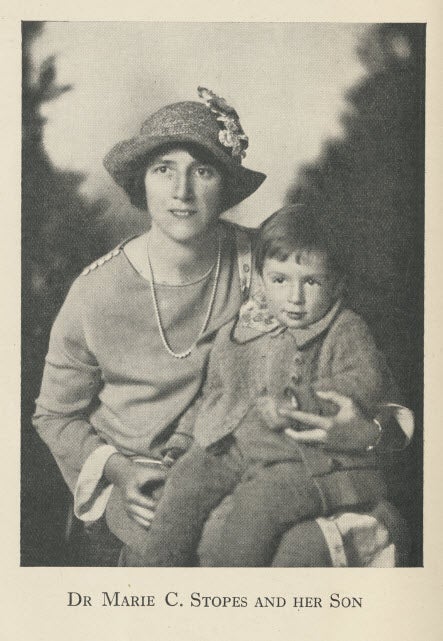 F9975: Marie Stopes and her son, Harry.
F9975: Marie Stopes and her son, Harry.
Hi, my name is Ishleen Singh. I am the new coop student at the Special Collections & Archives Department as of May 2019. During my time here, I have taken a look into the Marie Stopes archival collection. Marie Charlotte Carmichael Stopes was born in Edinburgh, Scotland. She was a very well-educated woman; she was a woman who advocated for eugenics and the women’s rights movements.
During her lifetime, Marie was married twice, first to Reginald Ruggles Gates and then to Humphrey Verdon Roe. Before her first marriage, while she was travelling Japan, she had an affair with Kenjiro Fujii, who was a married Japanese academic. At the age of 39, Stopes had her first pregnancy; however, the baby was stillborn. She later tried to have a child again and on March 27, 1924, she gave birth to her son named Harry.
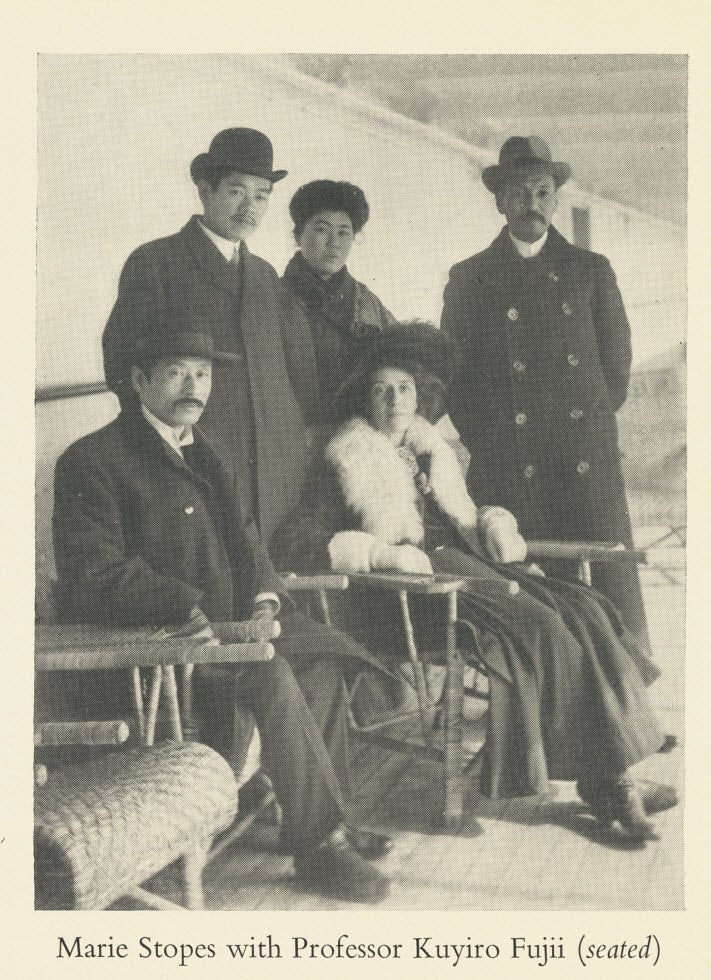 F10073: Kuyiro (Kenjiro) Fujii (seated) was a Japanese academic with whom Marie Stopes had an affair with.
F10073: Kuyiro (Kenjiro) Fujii (seated) was a Japanese academic with whom Marie Stopes had an affair with.
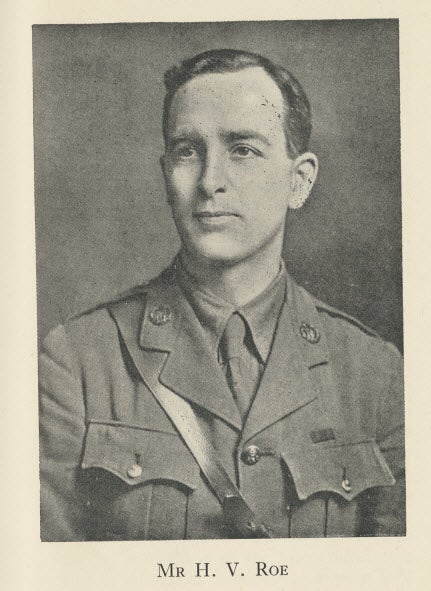 F10073: Humphrey Verdon Roe, second husband of Marie Stopes.
F10073: Humphrey Verdon Roe, second husband of Marie Stopes.
In 1921, Stopes opened up a birth control clinic in Holloway, London which then moved to Central London. There were many family planning organizations that started to open up and together they all joined to form the National Birth Control Council (now known as the Family Planning Association). At her clinic, she gave advice to families, along with trained individuals on how to use contraceptive methods such as: rubber sponge in olive oil, grease, lactic jelly, uterine contraceptives and condoms.
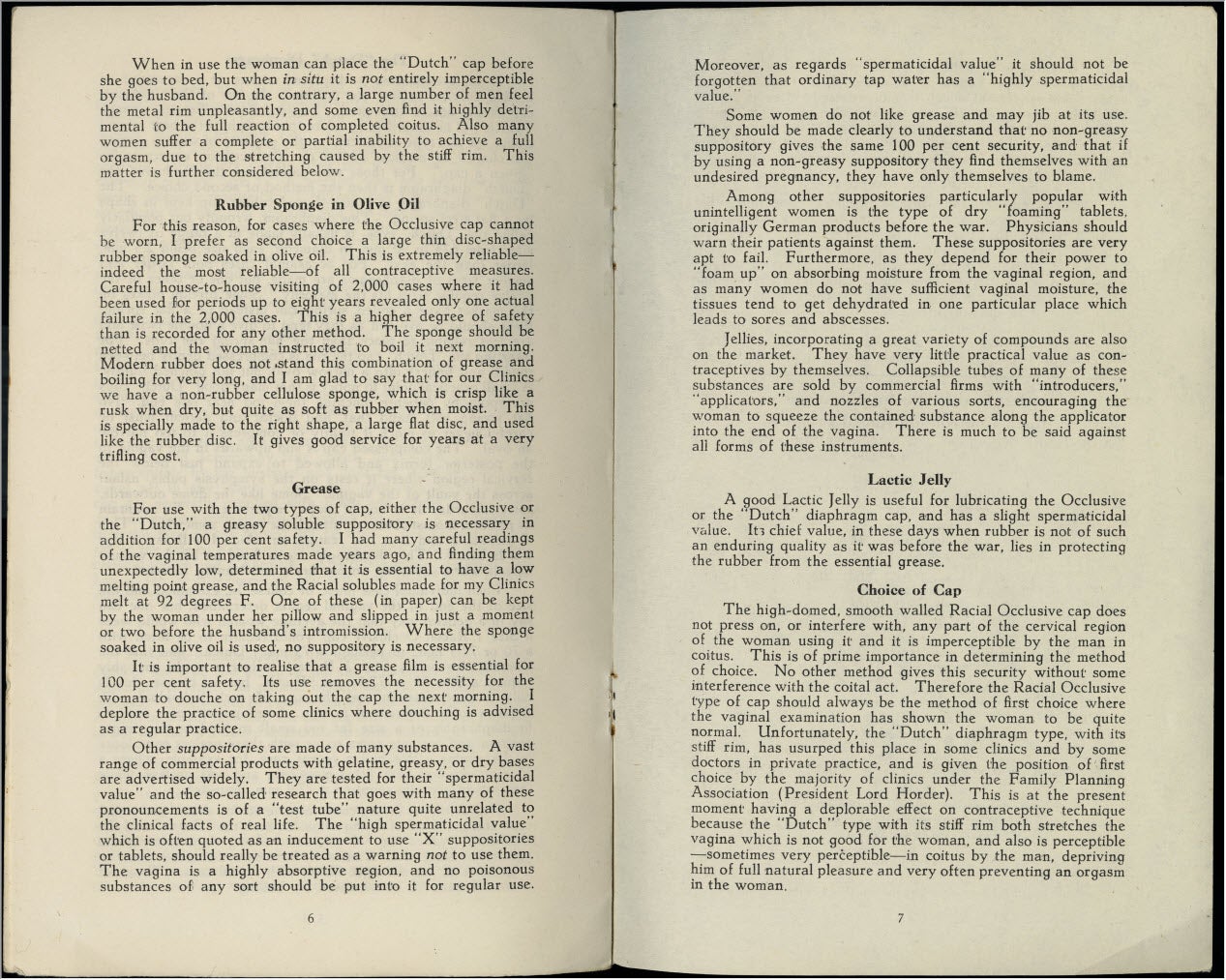 G9277: Stopes, Marie
G9277: Stopes, Mariea Charlotte Carmichael, 1880-1958. Practical notes on contraceptive techniques.
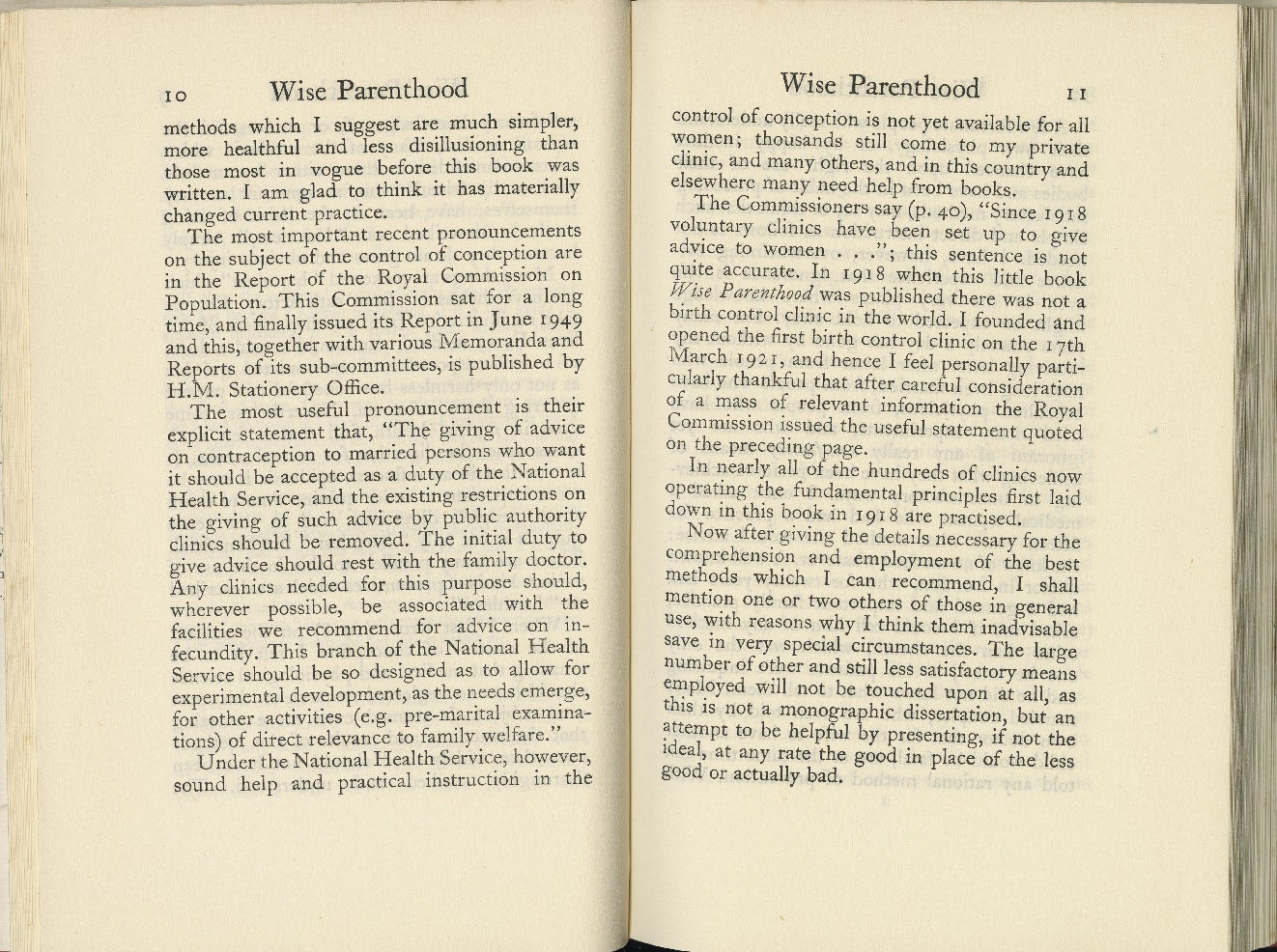 F9874: Wise Parenthood, 18th Edition, alternative preventative methods.
F9874: Wise Parenthood, 18th Edition, alternative preventative methods.
During a time when such a topic was controversial, Stopes was an advocate and publicly wrote about practical and preventative methods. With backlash from the Roman Catholic Church, she still stood her ground and wrote a book that addressed the Church (Roman Catholic methods of birth control). In the 18th edition of her book Wise Parenthood, Stopes stated that contraceptives are, “the greatest and most beneficent tool in the hands of the human race, and use [of birth control methods] would ensure world peace and racial progress.” She was a believer in eugenics that a child “cannot be born of a diseased father and a worn-out mother” (Marie Stopes: her missionand personality, an impression). By having children that are spaced out in age it would allow for the parents to have lower stress levels, along with give the parents time to be there for one another rather than be immersed in their children.
While she had much success in her professional career, her personal life was in shambles. In the later years, her marriage to Humphrey too came to an end. During the First World War, Humphrey was greatly injured which left him mentally and physically incapable to provide any form of pleasure to his wife. They stayed at the Old Lighthouse, Portland Bill in 1938, where Humphrey gave her a letter. In the letter, he made a sacrifice to allow her to be free of him, so she no longer suffered from the deprivation of physical pleasures that someone else could provide. At the same time, the relationship that Marie had with her son became complicated as well. Her son fell in love with a women, who Stopes did not approve of because she was near-sighted. In Marie’s perception this would make the children unfit, as they could inherit the trait.
While, Stopes advocated for the eugenics and women’s rights movement, she was also a writer. She wrote many poems, one of many that were addressed to Hitler during the Second World War. She was good friends with poet, Sir Alfred Douglas, from whom she developed her poetry skills from. There are a collection of poetry books written by Marie that can be found at the Special Collections & Archives Department.
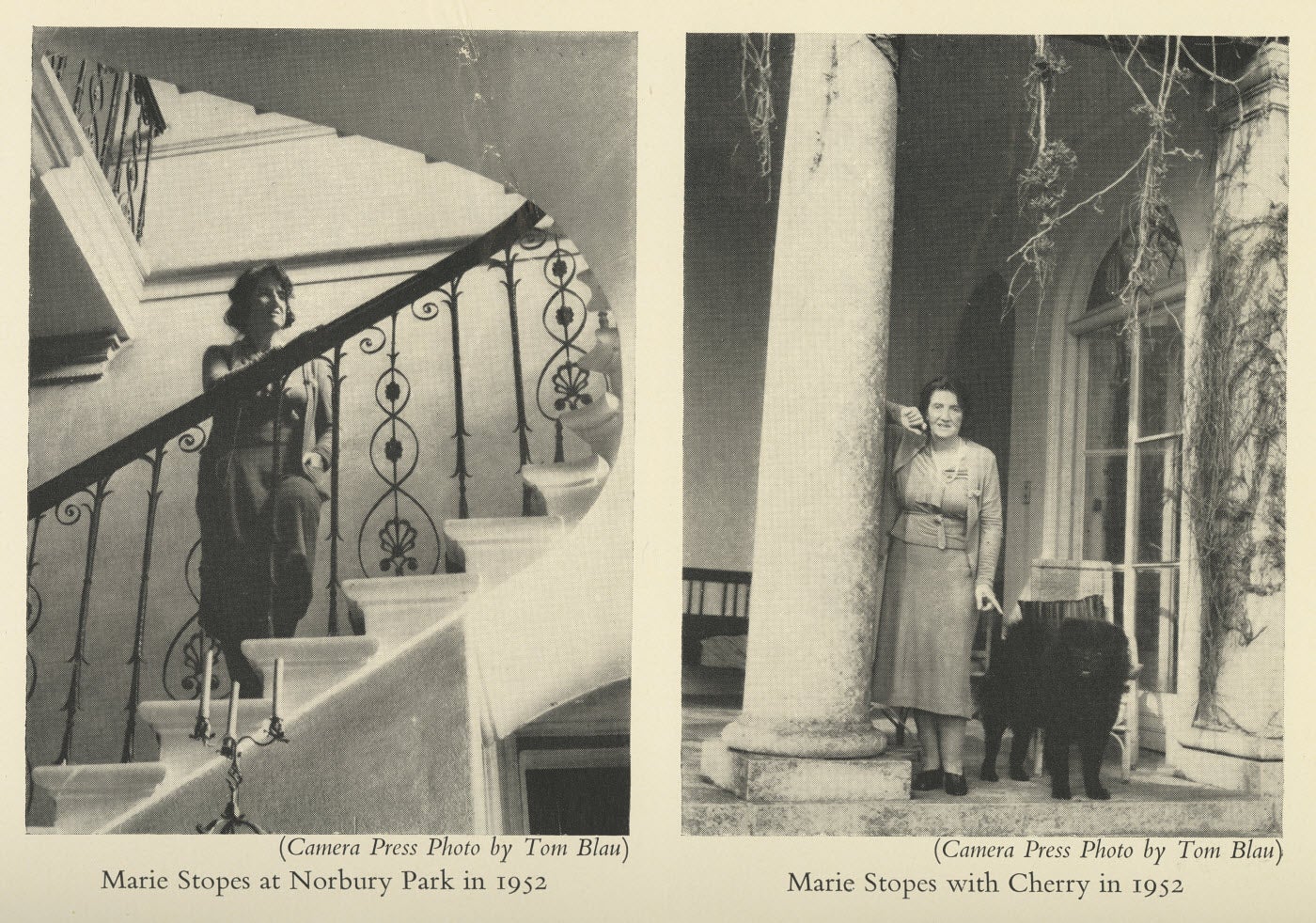 F10073: Marie Stopes.
F10073: Marie Stopes.
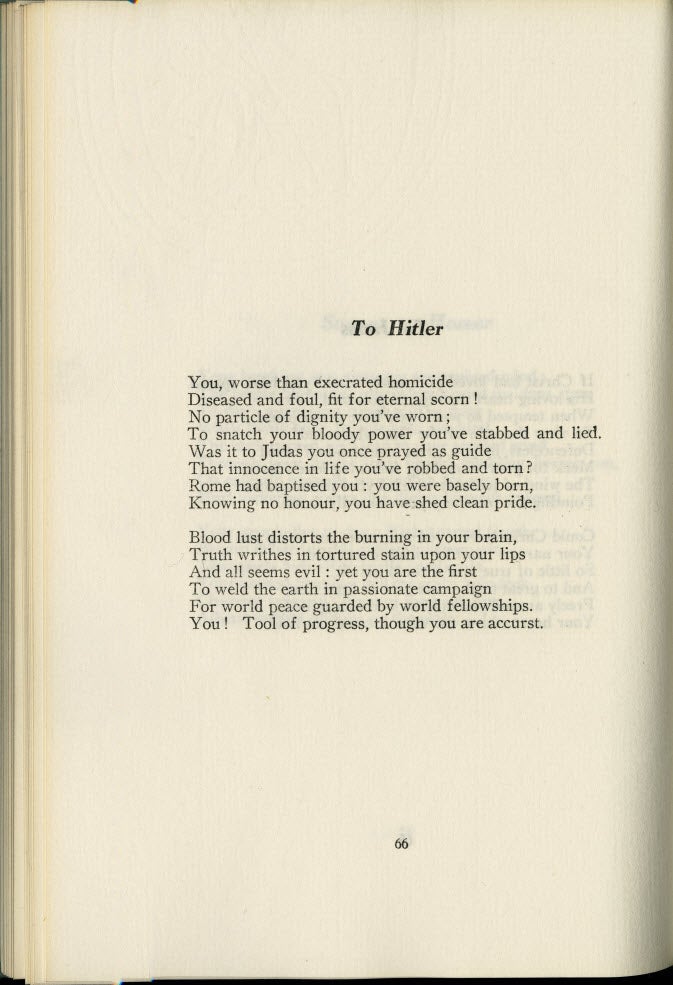 F10112: Wartime Harvest, poem addressed to Hitler.
F10112: Wartime Harvest, poem addressed to Hitler.
Marie Stopes passed away after battling breast cancer on October 2nd, 1958. As a supporter of the birth control movement in Britain, she had much success. However, as a believer in eugenics, she was looked down upon by many. She assisted in fighting a battle and making a change in Britain which took over globally! Although this is a brief overview of the life of Marie Stopes, the Special Collections & Archives department has a vast amount of books and artifacts correlated to the history of Marie Stopes.
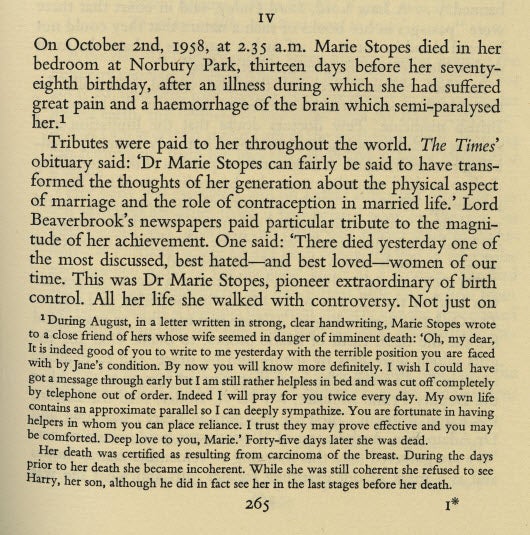 F10073: Passage that is tributed to Marie Stopes.
F10073: Passage that is tributed to Marie Stopes.




